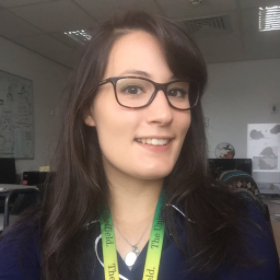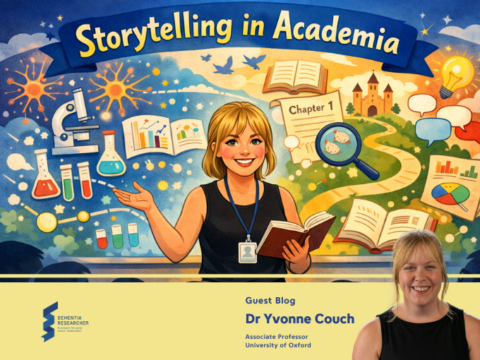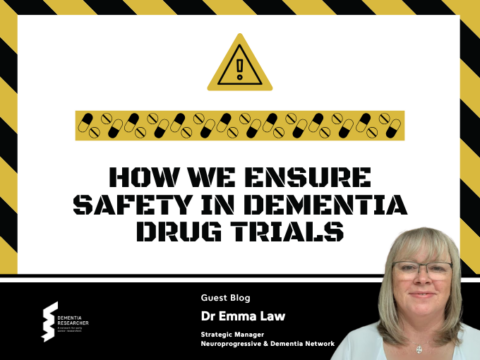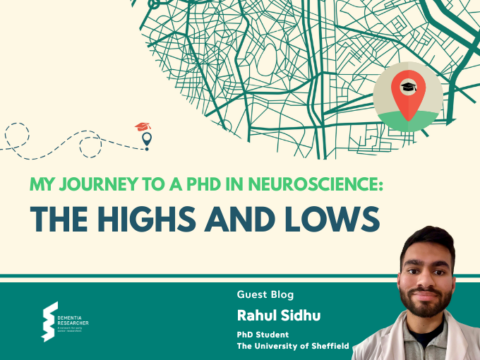Hi there, my name is Gaia and I am a neuroscientist at the UK Dementia Research Institute (UK DRI) at the University of Edinburgh. I am really looking forward to getting stuck into some blog writing for Dementia Researcher. I hope I will be able to share some insights into the life of a dementia researcher, my research area and experiences of studying and working in a different country to where I grew up. But for my first blog – at the risk of sounding way too egocentric! – I will be writing about me, my background, and how I came to be the neuroscientist and dementia researcher I am today.
As I might have given away already, I am not originally from the UK. I was born and raised in Milan, Italy. I was lucky enough to start learning English at the age of 7 and this opened up the possibility of studying abroad after I finished school. I wasn’t quite sure exactly what I wanted to study at university, I loved learning new languages but I was also fascinated by the human mind and how conditions like depression and schizophrenia can alter it. So, I decided to apply for Psychology courses in the UK. In a future blog I really want to explore why I made this choice and what it’s like ‘to do science’ in a different country, in a different language and at the same time adapting to a different culture. But for now, I will just say that having studied in English for the majority of my school years, it just felt right. So off I went to study for a BSc in Psychology at Bangor University, in North Wales. Yes, it was indeed quite a change.
Once in Bangor, I had my heart – and brain – set on becoming a Clinical Psychologist but a Neuroscience module in my second year, changed everything. Neuroscience, ignited an interest that still drives my research today, understanding the nitty gritty of the biological mechanisms behind brain-altering conditions like dementia. From that day forward, I was hooked and it led me to pursue more and more training in Neuroscience. With the help of a scholarship, I was able to apply for a masters in Neuroimaging and stayed at Bangor for another year. For my research project, I studied how current imaging methods, like functional magnetic resonance imaging (fMRI), can help us understand how and where in the brain we process faces.
How I then came to study for a PhD was perhaps a little different to most people – but hear me out. As part of my MSc, we had a module focused on ‘careers’ and one of the assignments was a – what I originally through was a fake – PhD application. The topic of this PhD encompassed everything I wanted to go on to do, study a neurodegenerative disease and work with dementia patients – or so I thought. In addition to submitting my application as a course requirement I submitted the same application for real. I was offered an interview but the PhD programme supervisor informed me that I wouldn’t be working with people but with animals! Animal work in research was something I knew very little about and I wasn’t exactly sure a) how I felt about ‘doing’ pre-clinical work and b) if I could actually do it! I decided to give the interview a go anyway and see how I felt about it after having had a chance to speak to my potential supervisor. I never once regretted taking on that PhD. I did find it incredibly challenging at first but through it I gained a new understanding of how animal models can help us uncover human disease processes. So, I left the not-always-rainy North Welsh coast, to spent the next 4 years at the University of Sheffield researching how neurodegenerative diseases alter brain neurovascular function.
I loved being a PhD student. I met some incredible scientists, some of whom I am lucky to call not only colleagues but friends, I was able to travel to Europe and America for conferences and build brains out of play-doh for outreach events – a highly sought-after party trick let me tell you.
But my PhD also gave me an amazing opportunity to teach in academia. My PhD was funded via a Teaching Fellowship, which required me to teach up to 180 hours a year alongside conducting my PhD research – I sense another blog post brewing! It was this joint research-teaching experience that put me in a very unique position in deciding my next steps. Do I seek a teaching position or do I apply for a research only post, i.e a postdoc? I found this decision really challenging to make, so I applied to both a teaching fellowship position in my department at Sheffield and a postdoc position at the University of Edinburgh. After what felt like an impossible decision, I accepted the postdoc position and moved to Edinburgh, in the depts of the Scottish winter – what was I thinking?!
I then spent the following two and a half years – +/- COVID-19 – assessing how extracellular matrix changes lead to cerebral small vessel disease and dementia. In this post I was able to continue my pre-clinical work, but I was also lucky enough to access post-mortem human brain tissue to increase the translatability of my research. My experiences in this first postdoc allowed me to take up another position at the UK DRI following the end of my contract, which brings me to where I am today. My current research focuses on understanding how immune alterations triggered by stroke shape chronic maladaptive immune responses that can lead to post-stroke cognitive decline and vascular dementia.
And this concludes our whistle-stop tour of my journey to becoming a neuroscientist, although let’s be frank, we never really stop evolving right?

Dr Gaia Brezzo
Author
Dr Gaia Brezzo is a Research Fellow based within the UK Dementia Research Institute at The University of Edinburgh. Gaia’s research focuses on understanding how immune alterations triggered by stroke shape chronic maladaptive neuroimmune responses that lead to post-stroke cognitive decline and vascular dementia. Raised in Italy, Gaia came to the UK to complete her undergraduate degree, and thankfully, stuck around. Gaia writes about her work and career challenges, when not biking her way up and down hills in Edinburgh.

 Print This Post
Print This Post




